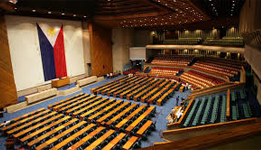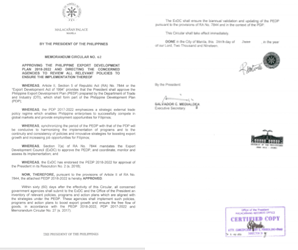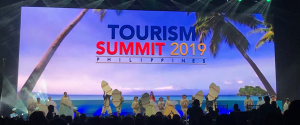 The President of Multimodal and Logistics Association Inc. (PMTLAI) Ms. Marilyn C. Alberto, reported during the 2nd Logistics Services Philippines Conference and Exhibition (LSPH) that the issuance of the Joint Administrative Order (JAO) which focuses to address the problems on high shipping cost and port congestion will be the “long term solutions to the problems that affects the logistics services ability to enable business competitiveness.”
The President of Multimodal and Logistics Association Inc. (PMTLAI) Ms. Marilyn C. Alberto, reported during the 2nd Logistics Services Philippines Conference and Exhibition (LSPH) that the issuance of the Joint Administrative Order (JAO) which focuses to address the problems on high shipping cost and port congestion will be the “long term solutions to the problems that affects the logistics services ability to enable business competitiveness.”
The JAO was spearheaded by the Department of Trade and Industry (DTI), Department of Transportation (DOTr), who already signed the JAO, as well as Department of Finance (DOF), together with the Bureau of Customs (BOC), and Philippine Port Authority (PPA). DTI Secretary Ramon Lopez remarked during his keynote speech that the JAO will be transformed into an Executive Order (EO).
Since the pronouncement of the JAO, PPA issued a detailed regulation thru PPA Administrative Order (AO) 002-19, addressing the transfer of overstaying import shipments in Manila South Harbor and Manila International Container Terminal to maintain the utilization rate.
Likewise, BOC also issued a Customs Memorandum Order (CMO) 13-2019 that provides the interim guidelines on the return of the empty containers at the Port of Manila and Manila International Container Port to avoid port congestion; also stating that the international shipping lines must ensure sufficient containers space for their empties.
The 2nd LSPH organized by the DTI was held last 15 July 2019 at the Philippine International Convention Center. – KJC

 The Export Development Council (EDC) through its Networking Committee on Legislative Advocacy and Monitoring (NCLAM) has prioritized the export sector’s legislative agenda for the 18thCongress to have a more competitive export industry.
The Export Development Council (EDC) through its Networking Committee on Legislative Advocacy and Monitoring (NCLAM) has prioritized the export sector’s legislative agenda for the 18thCongress to have a more competitive export industry. In a Presidential Memorandum Circular (MC) No. 62 approving the Philippine Export Development Plan (PEDP) 2018-2022, concerned government agencies are mandated to implement their respective programs, activities and projects (PAPs) relevant to the PEDP.
In a Presidential Memorandum Circular (MC) No. 62 approving the Philippine Export Development Plan (PEDP) 2018-2022, concerned government agencies are mandated to implement their respective programs, activities and projects (PAPs) relevant to the PEDP. In a recent pronouncement, DTI Secretary Ramon Lopez stated that the Departments of Trade and Industry, Transportation and Finance will issue the Joint Administrative Order (JAO) that will regulate local charges imposed by international shipping lines.
In a recent pronouncement, DTI Secretary Ramon Lopez stated that the Departments of Trade and Industry, Transportation and Finance will issue the Joint Administrative Order (JAO) that will regulate local charges imposed by international shipping lines. The Department of Tourism recognizes the importance of developing domestic airports in improving competitiveness and enhancing sustainable growth both in tourism and trade. It is also highlighted that the airports are not just gateways but more of economic growth drivers. This objective is included in the National Tourism Development Plan (NTDP).
The Department of Tourism recognizes the importance of developing domestic airports in improving competitiveness and enhancing sustainable growth both in tourism and trade. It is also highlighted that the airports are not just gateways but more of economic growth drivers. This objective is included in the National Tourism Development Plan (NTDP). The Department of Tourism (DOT) in collaboration with Go Negosyo and other partners like the ASEAN Business Advisory Council, Department of Foreign Affairs, Tourism Board of the Philippines, Philippine Chamber of Commerce and Industry and the Filipino Chinese Chamber of Commerce and Industry , conducted the country’s First National Tourism Summit last 02 May 2019 held at the World Trade Center in Pasay City.
The Department of Tourism (DOT) in collaboration with Go Negosyo and other partners like the ASEAN Business Advisory Council, Department of Foreign Affairs, Tourism Board of the Philippines, Philippine Chamber of Commerce and Industry and the Filipino Chinese Chamber of Commerce and Industry , conducted the country’s First National Tourism Summit last 02 May 2019 held at the World Trade Center in Pasay City.
 the TradeNet system and attach all documentary requirements by uploading it to the system. If approved, the exporters will receive an email containing a downloadable and printable file for the e-CO. Otherwise, the Exporter/s will be informed of the reason for disapproval through email and may file another application for e-CO.Since the full electronic sharing of e-CO among AMS is not yet operational and while the AMS are addressing all technical failures, “the Exporter shall download then print the e-ATIGA Form D, place his or her signature in the appropriate space, and submit the system-generated ATIGA Form D to the Bureau (BOC) for manual execution of signature and seal”.
the TradeNet system and attach all documentary requirements by uploading it to the system. If approved, the exporters will receive an email containing a downloadable and printable file for the e-CO. Otherwise, the Exporter/s will be informed of the reason for disapproval through email and may file another application for e-CO.Since the full electronic sharing of e-CO among AMS is not yet operational and while the AMS are addressing all technical failures, “the Exporter shall download then print the e-ATIGA Form D, place his or her signature in the appropriate space, and submit the system-generated ATIGA Form D to the Bureau (BOC) for manual execution of signature and seal”.
